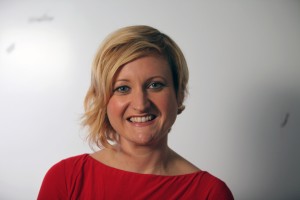
Street harassment is a pervasive problem that affects almost every woman and LGBTQ person in our society and across the globe. Emily May, co-founder and Executive Director of Hollaback!, helped start the international movement to end street harassment. She is one of the brightest, most engaged feminist activists, coalition builders, and change makers of our time. Emily also serves on YTH’s Board of Directors and will be speaking at this year’s YTH Live. I asked her some questions about Hollaback!, and online feminist activism:
1) You call yourself a Harassment Avenger (which, by the way, you totally are), so how did you get your start in activism against street harassment?
Ha, I think some article called me a “Harassment Avenger” and the name just stuck!
I started Hollaback! when I was 24 along with some friends. We weren’t trying to start a nonprofit, or a global movement, we were just trying to find a solution to all the harassment that we faced. We’d recently heard of a young woman named Thao Nguyen was riding the train into work when she saw a man masturbating in the train across from her. Thao took a picture and brought it to the police, but they didn’t do anything. She posted the picture on Flickr, and it quickly went viral and landed on the front cover of the Daily News. All of a sudden, the whole city was talking about public masturbation, and women citywide were sharing their stories. It seemed like everyone had one.
We were inspired by Thao, and thought – what if we put pictures and stories of harassers up on a blog? Hollaback! was born, New Yorkers from all five boroughs were snapping photos and swapping harassment stories.
But then something telling happened. We began to receive posts from outside New York—a lot of them. From outside the United States, even. That’s when we knew we had hit a nerve.
Now we are in 71 cities around the world including Berlin, Mexico City, and Chennai.
2) Hollaback! is in 71 cities and 24 countries around the globe. Why do you think feminist activists gravitate towards your movement?
It’s a couple things. First of all, I think it works because it’s not “my” movement. It’s their movement. Our site leaders are in charge of defining the problem and the solution in their own communities. We collaborate globally, but don’t need (or even want) everyone to agree. What we do want is for people to own the work and have all the love, support, and resources they need kick ass.
And secondly, I think it’s a little about timing. As a society, we’ve decided that workplace harassment isn’t OK. We’ve decided that bullying in schools isn’t OK. We all agree that words hurt, and have profoundly negative impacts on folks. Street harassment is the same issue, but in a new place. And as more and more people (especially young women) flood into cities globally, ending street harassment is going to become increasingly critical to maintaining the vibrant city street culture that we all love and enjoy.
3) At YTH Live, you will be one of the panelists during the closing plenary, “The Future of Online Feminism.” Do you see the fourth wave as being defined by online feminism? How can feminists work to better use the internet to achieve their goals?
Activists of all shapes, sizes and breeds have found a new playground on the internet. I think when online activism started, a lot of folks were using it like “old skool” media. Blogs were the new newspapers, social media was the new telephone, hashtags were the new consciousness-raising groups, but not much structurally changed other than who had access to the media.
I think right now you’re starting to see a shift. Online activists are recognizing that we can seamlessly implement strategies we’ve previously only dreamed of (like decentralized leadership) and we can take on issues that historically have been deemed “unsolvable” (like street harassment, racial discrimination, etc). I’m not sure what wave we’re in, but I do know I am excited.
4) Something that I’ve found in my own experience as an activist is that it’s critical to have different levels of involvement in any organization or movement. Do you agree? How does Hollaback! do this?
Totally! We have defined four levels: awareness, alignment, commitment, and ownership. Awareness means you know that street harassment is a problem. Maybe you’ve read an article we’ve written, follow us on Facebook, or the like. Alignment means you’re telling other people that street harassment in a problem, and by doing so, you’re scaling the movement. This could mean you’re telling your story online, participating in a tweet chat, or that you just explained street harassment to your dad over dinner. Commitment means you’re showing up in a serious way. You’re at a march or a rally, you donate to Hollaback!, or you made a rad YouTube video on why street harassment is the worst. And finally, ownership means you’re leading the movement. This where our site leaders come in. We train folks for free to lead the movement globally, and boy are they kicking butt.
5) How do you think the internet has changed the faces of feminism? Do you think it has been a tool that has furthered intersectionality, or is it just easier for the privileged to be heard even more?
Probably both! I do think the internet has given a platform to tons of folks that mainstream media wasn’t giving a platform to, but the internet hasn’t (yet) done away with racism, sexism, homophobia, ableism, or the lot — so we see a lot of that messed up stuff played out on the internet too. The progress is messy to say the least, but I find hope in that there is a lot of public learning happening as well.
6) What do you think makes for successful coalition building online? Is there a formula, or is it a matter of exposure?
I think it’s all about people who trust each other, and have each other’s backs.
7) Do you think we will ever live in a world without street harassment?
HELLS YES! It’s gonna happen sooner than you think.
You can hear Emily speak on the Closing Plenary at YTH Live on April 8th, “The Future of Online Feminism.”
 Erin Mckelle (@ErinMcKelle) is a member of YTH’s Youth Advisory Board. She is an e-activist, video blogger, student, and nonprofit advocate. A fierce feminist, she has launched several projects, including the Fearless Feminism blog and the Consent is Sexy video series about healthy sexuality. Erin is attending Ohio University as a women’s studies major. +Learn more about Erin
Erin Mckelle (@ErinMcKelle) is a member of YTH’s Youth Advisory Board. She is an e-activist, video blogger, student, and nonprofit advocate. A fierce feminist, she has launched several projects, including the Fearless Feminism blog and the Consent is Sexy video series about healthy sexuality. Erin is attending Ohio University as a women’s studies major. +Learn more about Erin
Image from iHollaback.org
tags: activist, Emily May, feminist, Social Media, speaker, street harassment, Youth Advisory Board, YTHLive2014.
